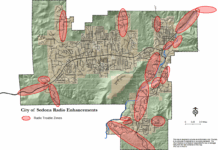Following a pair of meetings last week — totalling more than five hours — the Sedona City Council gave the go-ahead to those wishing to have chickens or bees on their property. In 2016, the city, along with the help of consultants Clarion Associates, began working on an long overdue update to the Land Development Code.
The LDC is a regulatory document that governs land uses, design of buildings and standards for parking, landscaping, fencing, color and material, etc. Additionally, it provides the processes for how proposals are reviewed. The LDC is also a tool used to implement the Sedona Community Plan, helping turn visions and goals into reality, a report states.
“Prior to the LDC update, staff received numerous comments, mostly in support of allowing the raising of chickens in Sedona,” the report states. “Local food production, including the consideration of allowing chickens and other potentially appropriate animals [e.g. bee colonies] was identified in early 2017 as one of the items to be evaluated in the update of the LDC. Urban agriculture is consistent with sustainability and environmental stewardship goals identified in the Sedona Community Plan.” In the end, the following is what council directed staff to include in the updated LDC:
Chickens:
- No minimum lot size.
- Up to four chickens on lots up to 20,000 square feet.
- Up to six chickens on lots greater than 20,000 square feet.
- 15-foot setback for coops and 25-foot distance to residences.
- Poultry will be chickens only.
- No slaughtering on city property.
- No notification requirements to neighbors.
- One-time permit but no licensing. Bees:
- No minimum lot size n Limit of two hives regardless of lot size.
- 5-foot setback for hives. n Notification requirements by city within 100 feet of subject property with educational component 15 days prior to location of hives.
- No signs required.
- Requirement to provide access to fresh water.
- Initial permit but no licensing.
- Initial hive must be from a queen who is docile.
- Flyaway barriers in compliance with other code requirements.
“I don’t feel we should make this an insurmountable barrier that people who want chickens have to meet,” Councilwoman Jessica Williamson said. “It’s working in Flagstaff and working in thousands of other cities. I think we have to be responsible in terms of actual nuisances such as smell and noise, and I think we’ve done that. But I don’t want to make it such a burden that no one can do it.”






















